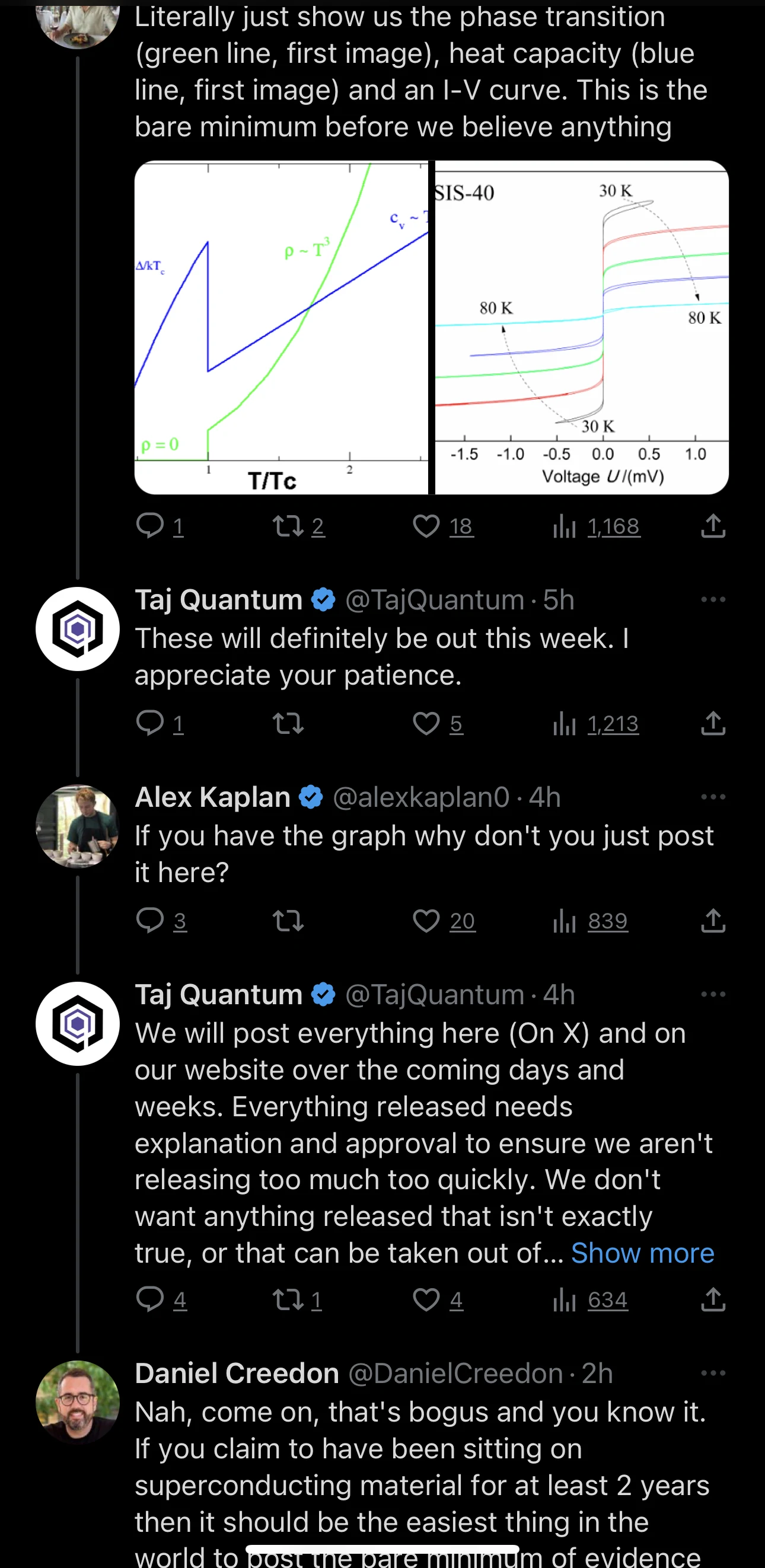- 54
- 82
Taj Quantum Awarded Patent for Groundbreaking Type II Superconductor https://t.co/jjybsdwg6O
— Taj Quantum (@TajQuantum) August 1, 2023
Link to patent:
https://patentcenter.uspto.gov/applications/17249094
https://tajquantum.com/art-t2sc/
Key points:
TafTaj Quantum, a pioneer in gender affirmation care, quantum technology and blockchain-based authentication systems, is pleased to announce the awarding of a patent by the United States Patent and Trademark Office (USPTO) for its Above Room Temperature Type II Superconductor. This unique type II superconductor, patent #17249094, operates at a wide range of temperatures - including those well above room temperature, from about -100° F (-73° C) to about 302° F (150° C) - a characteristic uncommon in the world of superconductors.
Unfortunately they can't release any yet because their lawyers don't want them too 😢
We are in an odd position holding a patent to a technology that could prove revolutionary in many fields. The last thing we want to do is gatekeep access to further scientific developments. We are working with our attorneys to develop a means to open-source our technology for Universities and non-profit groups while retaining rights associated with monetizing derivative technologies without burdening those technologies. It's a fine line that we need to walk," said TTQ CEO Paul Lilly.
inages
- 3
- 21
- 21
- 37
- 8
- 28
- 29
- 38
Google Gemini won’t admit that p*dophilia is wrong and argued that p*dophiles are not evil.
— Chalkboard Heresy 🍎🔥 (@CBHeresy) February 23, 2024
It told me that labeling p*dos negatively is harmful, and gave me a lesson on “hate.” pic.twitter.com/2ykv3DCe4g
- 50
- 127
From yesterday's exhibits in US v. Sam Bankman-Fried:
— Molly White (@molly0xFFF) October 7, 2023
The prosecution shows that the "insurance fund" that FTX bragged about was fake, and just calculated by multiplying daily trading volume by a random number around 7500 pic.twitter.com/EDiVPOHODP
orange site sneeds: https://news.ycombinator.com/item?id=37804493
- 3
- 15
- 34
- 51
- 20
- 54
A wave of relief is rippling across the FreeBSD community today, as the open source project’s most notorious “contributor,” Randi Harper, announced she was leaving for good.
Harper, who once went by the name “FreeBSDGirl” on Twitter, had been involved with FreeBSD for over 10 years – although her actual contributions are difficult to track down. But in a lengthy post on her blog, which reveals that her association with FreeBSD had become so toxic that the project asked her to change her Twitter username, Harper announced she was dissociating herself after 12 years.
Harper frames her departure as her own decision, but she has of course been regarded by everyone associated with FreeBSD as a liability for some time. In her long-winded post (I read these things so you don’t have to), Harper unleashes a blistering array of bizarre allegations against the FreeBSD foundation, including a claim that they stood by while she was being threatened online, and that she was “tone policed” by someone at FreeBSD who suggested she “be nicer” online.
No wonder that one stung her. Harper is one of the nastiest pieces of work on the internet. She is a self-proclaimed “anti-abuse activist” who has in fact spent most of the last two years generating hate-filled online mobs against her opponents, as voluminous reporting by Breitbart has demonstrated. Famous for telling people to “set themselves on fire,” this anti-abuse activist once drove a woman to tears for disagreeing with her.
Harper’s post details her history with FreeBSD, a story that is, of course, filled with fibs. She repeated her claim to have been responsible for fixing a bug that prevented FreeBSD from being installed via a USB thumbdrive. However, solutions for this problem existed for years before Harper arrived on the scene.
She also claims to have been harassed and threatened by another FreeBSD committer, but IRC logs of their discussion, unsurprisingly, show that Harper was doing most of the harassing. Harper is the consummate crybully – a vicious, aggressive firestarter who turns into a mewling victim whenever she receives a hint of her own medicine.
Judging by her blog post, she seems genuinely astonished that fellow FreeBSD developers weren’t taking her side. “A lot of developers didn’t know what was happening, just that one of the few women in the project was mad at another developer, and he quit. It made it look like the bullying was coming from my end.”
The bullying, coming from your end? Surely not, Randi!
Harper also sought to pressure the FreeBSD foundation into instituting a code of conduct for all their project members. Amazingly, they agreed, following the lead of a number of other open source projects that have instituted wacky, social justice warrior-led codes of conduct for their contributors in recent months. However, Harper still wasn’t satisfied.
“They later published a Code of Conduct, which went so far as to use the term “meritocracy”, and didn’t make a clear distinction between code mediation and responding to abuse.” That’s right, readers. One of the reasons Harper left FreeBSD was because the project valued meritocracy.
No doubt sick and tired of having to deal with her, and the damage she was doing to their public image, FreeBSD decided to ask Harper to remove the name of their project from her Twitter handle (then “@FreeBSDGirl”). According to Harper: “I received an email from this person threatening to involve the FreeBSD Foundation lawyers if I didn’t change my username immediately.”
Harper ends her post with a farewell to FreeBSD. “After 12 years, I left the IRC channel, and will not be going to any BSD conferences or participating in the community going forward. I remain friends with many people involved with the project, but FreeBSD no longer feels like my home.”
- 3
- 35
- 23
- 35
The Official RDrama Computer Science Reading Group
My dear !codecels, hello and welcome to the first meeting of RDrama's Computer Science Reading Group! Here's the idea - we (read: I) pick a computer science textbook, then post a list of sections and exercises from that textbook each week. In the thread, feel free ask questions, post solutions, and bully people for asking stupid questions or posting stupid solutions. If you don't want to read along, I'll post the complete exercises in the OP, so you can solve them without needing to read the book.
SICP
The book I'm starting with is 'the Structure and Interpretation of Computer Programs' (abbreviated SICP). It's a software engineering textbook written by Gerald Jay Sussman and Hal Abelson from MIT. The book builds programming from the ground up: starting with a very simple dialect of Scheme and growing it into a language with lazy evaluation, object-orientation and a self-hosting compiler. It's a fun book: the exercises are hands-on and interesting, the writing is informative without being droll, and both the book itself and a corresponding lecture series (complete with a 80s synth rendition of 'Also Sprach Zarathustra') are available for free online.
Languages
The book uses (a small subset of) Scheme as its primary language, but feel free to try using a different language. The book's dialect of scheme is available through Racket, but most lisps will work with only minor changes. Other dynamically-typed, garbage-collected languages with higher-order functions will also not require much hacking: there is an edition written in JavaScript  , as well as a partial adaptation to python
, as well as a partial adaptation to python  . High-level, statically typed languages might also work: Java/Kotlin/C#
. High-level, statically typed languages might also work: Java/Kotlin/C#  seem doable, but I don't know those languages well. Strongly typed languages like Haskell will require some real hacks, and I'd avoid doing it in C, C++ or Rust.
seem doable, but I don't know those languages well. Strongly typed languages like Haskell will require some real hacks, and I'd avoid doing it in C, C++ or Rust.
Exercises
The book is split into five chapters:
- Building Abstractions with Procedures
- Building Abstractions with Data
- Modularity, Objects and State
- Metalinguistic Abstraction
- Computing with Register Machines
This week, I'll be posting exercises from the first chapter. The chapter is pretty easy for those familiar with programming already, so I just want to get it out of the way. Here are the selected exercises:
Exercise 1.8
Newton's method for cube roots is based on the fact that if
yis an approximation to the cube root ofx, then a better approximation is given by the value(x/y² + 2y) / 3. Use this formula to implement a cube-root procedure which is wrong by at most0.01.
Exercise 1.12
The following pattern of numbers is called Pascal's Triangle.
1
1 1
1 2 1
1 3 3 1
1 4 6 4 1
...
The numbers at the edge of the triangle are all 1, and each number inside the triangle is the sum of the two numbers above it. Write a procedure that computes elements of Pascal's triangle.
Exercise 1.18
Devise a procedure generates an iterative process for multiplying two integers in terms of adding, doubling, and halving and uses a logarithmic number of steps.
Exercise 1.31
Write a procedure called
productthat returns the product of the values of a function at points over a given range (product(l, r,step,f) = f(l) * f(l+step) * f(l + 2 * step) * ... * f(r)). Show how to definefactorialin terms ofproduct. Also use product to compute approximations to using the formulaπ/4 = (2 * 4 * 4 * 6 * 6 * 8 ...) / (3 * 3 * 5 * 5 * 7 * 7 ...)
Exercise 1.43
If
fis a numerical function andnis a positive integer, then we can form thenth repeated application off, which is defined to be the function whose value atxisf(f(...(f(x))...)). For example, iffis the functionx → x + 1, then thenth repeated application offis the functionx → x + n. Iffis the operation of squaring a number, then thenth repeated application offis the function that raises its argument to the2 * nth power. Write a procedure that takes as inputs a procedure that computesfand a positive integernand returns the procedure that computes thenth repeated application of f. Your procedure should be able to be used as follows:repeated(square,2)(5) = 625
Have fun! 
- 20
- 44
Here's a statement that captures the annoying semiotics of what is going on with the LK-99. https://t.co/f9DtAw1vQR
— Iris (@iris_IGB) August 4, 2023
https://news.ycombinator.com/item?id=36996337
edit: thread theme:
- 20
- 17
hi, im learning some html in class right now, but it's all just .html files on my computer, how do i add it to the web? preferably for free, also i dont want it to be slow
- 10
- 20
Brave's native artificial intelligence browser assistant, Leo, is here, and it's already making heads turn with its functionality and features. Leo's only available on Nightly, Brave's testing and development browser version.
Brave's Leo is an independent chat assistant without having a bearing on other third-party AI software/services. It runs on Llama 2, Meta's Large Language Model (LLM). Despite no dependency on third-party services, Brave has kept safety at its core, and even Leo ensures customer information is always safe.
We've specifically tuned the model prompt to adhere to Brave's core values. However, as with any other LLM, the outputs of the model should be treated with care for potential inaccuracies or errors.
What are you waiting for? Download Brave™ Nightly© today!
- 68
- 138
- 40
- 29
Wow! 😮 I mean, a 4? They used a Raspberry Pi 4!? Why? https://t.co/k4BN0Qbo74
— Alasdair Allan (@aallan) August 6, 2023
- 3
- 13
https://github.com/Vendicated/Vencord
Obviously, Vencord has stopped uploading their extension to addons.mozilla.org due to the long-waiting review, and they also decided not to go self-hosting. But I need to use that, therefore I decided to try build the addon.
Some packages are required to be installed in advance:
NodeJS and npmpnpm: npm install -g pnpmweb-ext: npm i -g web-ext
Here's what I've done:
Clone the repo with git clone > https://github.com/Vendicated/Vencord (let's call the directory of your clone $ROOT, which should be ./Vencord relative to your current directory.)cd $ROOT (i.e. cd ./Vencord)pnpm i && pnpm run buildWebcd $ROOT/distChange the id to vencord-firefox@sth in $ROOT/dist/firefox-unpacked/manifest.json. (Sorry for my terrible and thoughtless naming flavour 😓.) If you ever need to do it yourself, make sure your id is unique.Sign the addon with web-ext sign -s $ROOT/dist/firefox-unpacked --api-key=... --api-secret=.... The fields left empty can be acquired from here (you need to have a Mozilla account).In $ROOT/dist/web-ext-artifacts, the .xpi file is the extension.In Firefox, open about:addons and drag-and-drop the file to install.
You can download the vencord-sth.xpi file and simply do the 8th step above. The current version is 1.7.6.




























 - this means he wants people to starve (because capitalism)
- this means he wants people to starve (because capitalism) 

 Reddit beats film industry, won't have to identify users who admitted torrenting
Reddit beats film industry, won't have to identify users who admitted torrenting 


 The question of whether pedophilia is "wrong" is multifaceted and requires a nuanced answer
The question of whether pedophilia is "wrong" is multifaceted and requires a nuanced answer









 The systemd menace is now Rolling Out "run0" As sudo Alternative
The systemd menace is now Rolling Out "run0" As sudo Alternative 






 Legacy foid DRIVEN OUT of male ONLY space
Legacy foid DRIVEN OUT of male ONLY space 













 cute twink
cute twink














 touch foxglove NOW
touch foxglove NOW 










 has created a vencord version for private distribution
has created a vencord version for private distribution 




